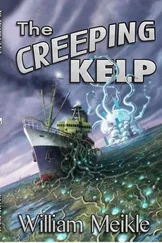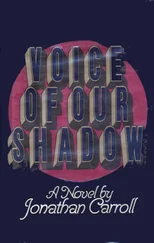Lockwood glanced toward the western sky. “And we’ve still got a bit of time before things get tasty. Let’s go.”
We took our bags and walked in silence up the drive. Somewhere in the hedge, a blackbird was singing its lovely, piercing song. There was a fresh smell on the air that afternoon, the faint warmth of coming spring. The house waited at the end of the drive.
We reached the porch without incident; here Lockwood insisted on rigging up a small circle with a lantern inside, as an outer line of defense. With luck, the lantern would remain burning all night, unaffected by whatever happened in the building. It was a place to rendezvous if anything went wrong.
While this was being done, I stepped onto the grass and peered through the big front window. Inside was a bare room, bisected by yellow sunlight. The walls had brown-striped paper on them; there was a yellowish carpet, but no furniture. You could see faint outlines where pictures had hung; on one wall was an old-fashioned fireplace, swept clean.
George was at my shoulder. “Looks like the living room,” I said.
He nodded cheerily. “Yeah. It’s where they found the victim’s feet. In a fruit bowl on the coffee table, apparently.”
“Lovely.” I put my fingers on the surface of the glass. Sometimes, even outside, even with the sun still in the sky, you get stuff. I listened. Anything? No. Only the blackbird singing. The house was just a house.
Given that the place had been abandoned for so many years, the key turned with surprising, almost ominous ease. Lockwood was the first to enter, then the others filed in slowly. I stayed behind to tend to my backpack. Holly knew about the existence of the skull, but Kipps didn’t. I wanted a quiet word with it.
I flicked the valve at the top of the jar. “Heads up, skull, we’re here. I’m bringing you inside.”
“For what? Get your living friends to help you. I’m having none of it.”
I rolled my eyes; the ghost had been sulking all day, ever since I’d come back from my meeting at Fittes House. His outrage at my agreement with Lockwood knew no bounds. I hefted the backpack in my arms. “Just tell me if you sense anything.”
“No. Why am I always stuck in this bag? I’m sick of it. Let me out.”
“I can’t right now. If I get a chance, I will.”
“You’re embarrassed about me, that’s what it is.”
“Embarrassed? About an evil, moldy skull?” I glared into the jar; sure enough, the face in the glass wore a hurt and haughty look. “Oh, for heaven’s sake. You’re a Type Three ghost,” I said, “and that makes you rare. If it got out that I could talk to you, neither of us would hear the end of it. I don’t want Kipps to know. Keep watch, and I’ll check in with you later. We’re going in, so stop moaning.”
“What kind of way is that to talk to a valued partner? I ought to—” The voice broke off; I had stepped through into the quiet house. “Ooh…”
I stared down at the ghost. The face had frozen the moment it crossed the threshold. A single translucent muscle in its cheek twitched. Its eyes were saucers of dismay.
“Ooh, what?”
The eyes blinked twice; the face was animated once again. It glared at me. “Nothing. For a moment, I thought I felt…But hey, I was wrong, as us evil, moldy skulls so often are. Forget about it.”
The tone of the voice was unconvincing. I would have questioned the ghost further, but I saw Kipps coming back along the hall. I closed the backpack and swung it over my shoulder. Then I took a deep breath, and absorbed my first impressions of the house.
I was in a narrow hallway, with a staircase running up its left-hand side. As in the living room, the carpet was a worn and faded yellow color, the walls decorated with an old-fashioned and revolting pattern of cream-and-brown squares. At the end of the hall, a door of plate-glass panels opened onto the kitchen, where Lockwood and Holly were laying out a second circle of iron chains. There were two other doors; one which (as I knew from George’s floor plans) led to the basement, and one to the living room. The place had a smell of dust and dampness, but nothing worse. Whatever the skull may have noticed, my inner senses detected nothing.
“Grim old hall,” I said. George was going past with a heavy bag.
“Yeah. They found the thigh bones here, propped in an umbrella stand. We’re getting everything set up. Feel like helping out, or is that not in your freelance contract?”
I opened my mouth to answer, then snapped it shut. It was a fair point. I went to get my bags, and set to work.
It had to be said, we did everything by the book. Within minutes of our arrival, all our defenses were in position. We had an iron circle in the kitchen, and another on the landing, both amply supplied with salt and iron. We had candles burning in every room, and snuff-lights on the stairs. We did it efficiently and well. Kipps didn’t gripe too much, and Holly Munro seemed more comfortable with fieldwork than when last I’d seen her. For my part, I discovered that working alongside the others was easier than talking with them, and I soon fell back into the old routines. Lockwood and I didn’t say a great deal. That was fine. He wanted me for my Talent, not my conversation.
When all was ready, and with the daylight shrinking, we made our separate ways around the building, quietly taking readings and letting the atmosphere of the house sink in. The one exception was Kipps, who sat cross-legged in the kitchen, drinking hot chocolate and reading a newspaper. He didn’t have sufficient Talents to do any psychic exploration.
The first thing to be said is that the Guppy house was small. The ground floor had four rooms—the hall and living room, the dining room and kitchen—while upstairs there was a long, thin landing, with two bedrooms at opposite ends and a bathroom in between. Under the stairs, a steep flight of brick steps led down to a concrete-floored basement. The attic, unfinished, contained nothing. The house was of relatively modern construction, with paper-thin walls and double-glazed windows. All of the furniture had been taken away, the walls stripped of decoration. It held no obvious secrets, and psychically was very quiet. George popped up in every room like a sinister real estate agent, giving macabre tidbits of information about what body parts had been found there, but even with such details, the place was curiously blank.
Despite the history of the place, it was hard not to feel confident as we imposed ourselves upon it. There were five of us, fully armed, in a building of nine rooms. We kept bumping into each other as we went up and down the stairs. None of us was ever more than a few seconds’ scamper from anyone else, or from one of the two circles. It was all fairly reassuring.
But the daylight had not yet left us.
The kitchen interested me. It seemed a likely focus for supernatural energies, given what had happened there. I stood in it for a long while, listening, looking at the old-style décor, at the stained Formica countertops with their mustard-colored cabinets below. A metal sink, dark and stained, sat on narrow legs beneath the wide window. The walls were papered with brown-and-orange flowers, the floor laid with brown linoleum. You could see where it had been pried up, when investigators looked for evidence long ago. A pantry closet in one corner had been emptied, its shelves stained with rings from cans and jars.
Three doors led out: to the hall, to the garden, and to the dining room, a small square space connected only to the kitchen.
I concentrated. So many little sounds. Kipps rustling his newspaper; Holly going down into the basement; Lockwood moving around upstairs. And I also sensed other, furtive noises, not tied to anything physical, time-locked, out of place.
Читать дальше









